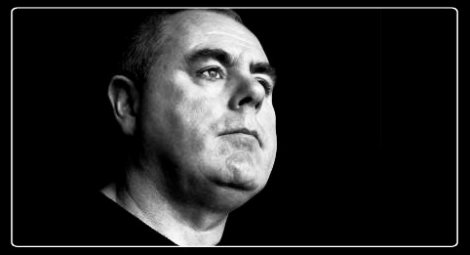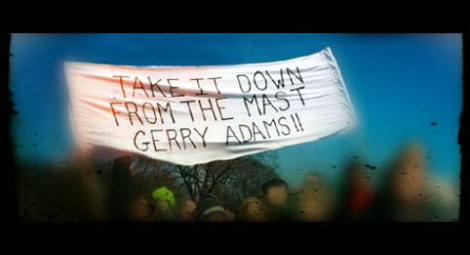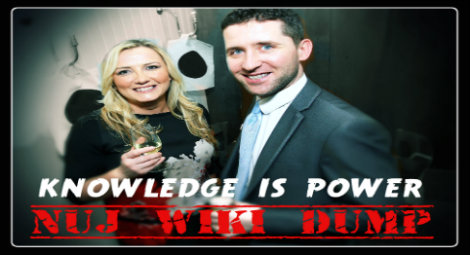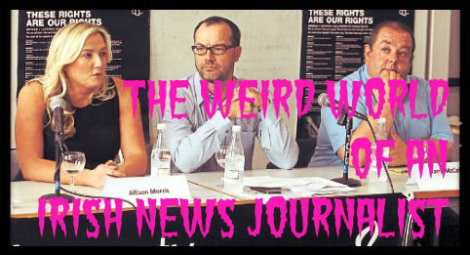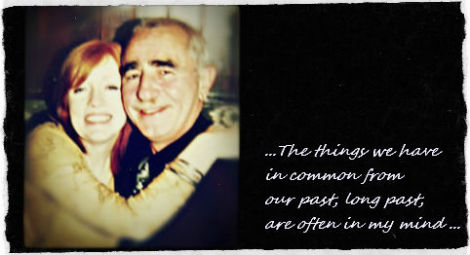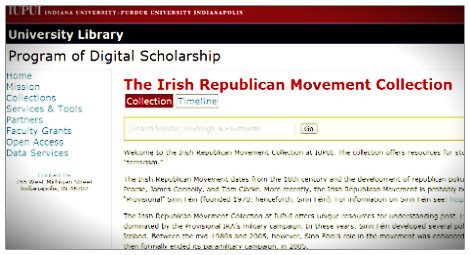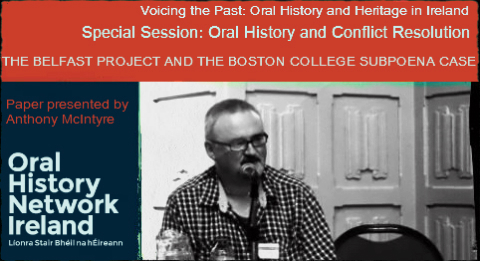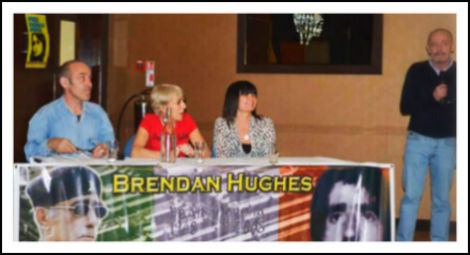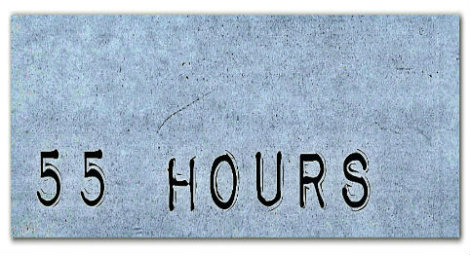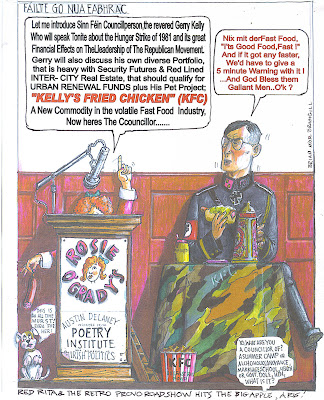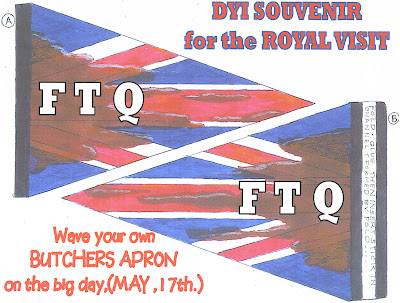Tonight The Pensive Quill features Martin Galvin's speech at the recent commemoration for Brendan Hughes in County Louth.
An influential New York radio program, Radio Free Eireann, where Brendan Hughes’ voice was often heard, begins each week with a song that shouts the words “unrepentant Fenian bastard!” Years ago when first I came across the phrase “unrepentant” Fenian or “unrepentant” Republican, it puzzled me. Repentance to me meant remorse and contrition for some wrongdoing that one later comes to regret.
We mark Easter as our national day to honour Ireland’s patriot dead and pay tribute to their unbroken bond with the volunteers of 1916 by reading the Proclamation. That generation honoured the Fenians, whose very graves they said, guaranteed that” Ireland unfree shall never be at peace.” Later the word Fenian came to be commonly used as a label to abuse any defiant Republicans who did not bend the knee to British rule or the beneficiaries of sectarian privilege.
Either way I took the term to be a compliment, high praise, and another way of saying Irish patriot. No one speaks of a repentant patriot. Why should any Fenian or Republican be repentant and why would it ever be noteworthy to single out any Fenian for being unrepentant? Of course it is easier to see the meaning today.
Brendan Hughes surely lived and died as an unrepentant Fenian. He could have no more repented, nor disowned, nor denied his part in the IRA’s fight against British rule, than he could repent being Irish, or disown Belfast, or disavow the legitimacy of the Irish struggle by donning a British criminal uniform in the H-blocks of Long Kesh.
The very suggestion that he repent, disown or even minimize his part in the struggle to make himself more politically acceptable to the British, much less to a Paisley or Robinson led Stormont, would have been answered with that sly mischievous grin, perhaps a chuckle and an instruction to ”cop yourself on.”
Last week David Cameron managed to take time out from his busy schedule with more important matters, to visit what he repeatedly and deliberately calls “this part of the United Kingdom”. He patted himself on the back for the Bloody Sunday families’ hard won apology, said he did it to close the chapter, and spoke of honouring those who he says served with distinction in upholding British rule and law. There does not seem to be much repentance there for the Ballymurphy Massacre, or shoot-to-kill, or internment, or collusion murders with loyalist death squads, or torture or Hunger Strike deaths, Diplock Courts or any of the many other unjustified and unjustifiable acts, mere tactics, wielded in the name of British law and rule. His arrogance is of course in line with what Republicans have always heard from the British crown. Cameron by the way was applauded at Stormont.
Brendan Hughes took pride in counting himself as one of those men and women who” served with distinction” standing against these unjustified and unjustifiable acts committed by those upholding British rule and law, and against the very idea that the right of Irish people to national freedom vanishes into the air a few miles from here.
It should hardly be necessary for me to speak about his part in the struggle in the presence of some who were with him, with him in the streets of Belfast or the infamous H-blocks of Long Kesh.
However some mention must be made if only because some, in the name of the new political dispensation, seem to believe that it is permissible to dispense with the reputations and role played in the struggle of those like Brendan, who did not fall in line behind the narrative. Our presence here today, the memorial lecture of a few weeks ago, the murals of him, so fittingly near murals dedicated to Republican political prisoners, are proof if any were needed, that Brendan Hughes is beyond any attempt to discredit, diminish or dispense with his exploits.
Like countless others, I knew of him long before I would meet him. Like a Jim Lynagh, or Pete Ryan or Francis Hughes among so many others, Brendan Hughes was one of those volunteer IRA soldiers whose courage and determination seemed to overflow into those alongside them, somehow instilling confidence that the overwhelming military advantages held by British crown forces would someone be neutralized or overcome because he was there.
He was fearless, a leader who was there at the beginning in Belfast, rose through the ranks, and led from the front. He saw family members killed, faced imprisonment and was not deterred.
It was perhaps most characteristic of him that when he escaped from a British prison he did so not to gain safety in the south or even a respite, but to get back to Belfast and the fight within days.
In the H-blocks he had the unenviable, if not near impossible task of rallying the H-block blanketmen, the 300 Spartans, as Richard O’Rawe described them, keeping up their spirits and morale in the daily fight against British criminalization while at the same time, exercising the restraint and patience required by the Republican movement, to build the campaign which would eventually inspire countless thousands across Ireland and across the globe to rally behind the blanketmen against Thatcher’s brutal torture.
When all attempts at a political resolution, including that by Cardinal O’Fiaich were dismissed by Thatcher, and the ultimate protest, hunger strike, was forced upon Republican political prisoners, Brendan Hughes volunteered to lead. While himself suffering 53 days of hunger strike, on the back of years of protest, the responsibility fell upon him to end the first hunger strike in time to save the life of Sean McKenna. We would then see Thatcher throw away still another opportunity to resolve the protest, instead choosing tactics which would mean the death of ten hunger strike martyrs, in her vain effort to break the struggle by breaking the prisoners.
After his release from Long Kesh, Brendan volunteered to come to the United States to collect funds for the Republican Movement. It was not an assignment he relished, but one that was important to the struggle. He would begin meetings by explaining he was not there to seek monies for Irish Northern Aid or the families of political prisoners or even for Sinn Fein. He was raising money for the IRA.
He threw himself into the tour, meeting small groups answering questions and explaining strategy. He worked with patience, determination and some humor and succeeded nearly doubling his original goal. He was perhaps too successful. It is perhaps no coincidence, that when he returned to Ireland he was slotted into the IRA’s security department, where he could be checked by at least one prominent British agent, Freddie Scappaticci, while another paid British traitor, Denis Donaldson would be posted to New York the next year where he could knock down all that Brendan had built up.
In those days, the British trumpeted the propaganda fiction that the IRA fight was not due to the injustice of British rule but because so-called godfathers were profiting from the war. Anyone who ever visited Brendan Hughes would see this claim for the lie that it was, as he clearly never asked or accepted any profit, from a struggle in which he had given years of his life.
Later, he would come to question a deal that he feared would not only barter away acceptance of British rule and a unionist veto, but would hijack Republicanism,- maneuvering some well-meaning Republicans into positions within a British Stormont administration or constabulary boards where they inescapably would be used by the British to put a Republican front on British rule.
How easy it would have been for him to keep silent, perhaps be seen at the odd political event or commemoration and simply enjoy the prominence, fame and opportunities, which his part in the struggle might have merited. Instead the same beliefs which brought this Unrepentant Fenian out onto the streets of Belfast to join the struggle against the forces of the British crown now led him to decide that loyalty to the struggle demanded he speak against the deal, and direction in which the Movement was headed.
His arguments were seldom answered on the merits but sidestepped with fanciful claims that Brendan was affected by the hunger strike or his years of imprisonment. The worst and most hurtful of these was the slander that he was against the leadership on a personal basis. This was a movement led by some with whom he had fought alongside, been imprisoned and risked his life. The idea of speaking against a leadership which included such close friends must have been heartbreaking for him and harder in some ways than refusing the crown uniform in Long Kesh. Such slanders were created to enable others to justify themselves to themselves without dealing with the truth behind his words.
He became a rallying point for debate, for independent Republican analysis, and for legitimate criticism at a time when many who could never be intimidated into talking at Castlereagh were intimidated into silence by threats, pickets, slurs or ostracism so strong that it could push a strong individual like Whitey Bradley to take his own life.
Today it is important to return to the fundamental question of that debate. Is this Stormont deal a transition to a united Ireland? Will accepting British rule, taking Stormont ministries or places on constabulary boards, and banding together in partnership with the DUP, succeed in removing the injustices underpinning British rule, overcoming the unionist veto and uniting Ireland?
Or was the deal planned by the British to be a final resting place for Republicans? Will those who become wedded to a British administration ultimately be wedded to its injustices- their very presence and reputations as Republicans trotted out to present visible Republican faces behind which British rule will be administered in British interests? Will those from the unionist community be swayed to join them in a united Ireland or is it more likely that some from the nationalist community, who take up jobs and positions, begin to think that British rule is not so bad for me?
We need only look to Maghaberry, and the plight of Republican prisoners which was always so close to Brendan’s heart. Thirty years ago, Republicans were in the midst of a Hunger Strike in Long Kesh.
It had been forced on the prisoners by years of beatings and “naked brutality”, much of inflicted during mirror searches of naked prisoners. The British crown indulged the sectarian brutality and beatings because it served British objectives. Forcing Republican prisoners to wear a criminal uniform was part of a strategy, to claim the six counties as normal, and claim those in Long Kesh or Armagh as criminals duly convicted by Diplock courts.
Many who supported these Republican prisoners, Cardinal O’Fiaich first and foremost, did not support the armed struggle, but did so a humanitarian basis, noting that the Blanketmen were jailed under special laws, by special Diplock Courts, for unselfish politically motivated actions that would never have occurred except for the political situation. Which of these criteria does not apply to Republican political prisoners in Maghaberry today?
Why cannot Sinn Fein on this same basis halt this naked brutality and secure the enforcement of the reasonable agreement made last August 12?
Why today in Maghaberry under a compromised justice ministry, and handpicked minister, is this brutality allowed to continue?
Why do we hear DUP members and David Ford sounding Thatcher like in saying no concessions and Sinn Fein unable or unwilling to halt this naked brutality?
Marian Price is also in Maghaberry, not for anything she said or did at an Easter Commemoration in Derry, (although the day when it is illegal to commemorate Easter and its meaning in the six counties may be coming .She is there because a British official arbitrarily revoked her decades old license.
One of those then charged with her, has a top position at Stormont and on the constabulary board. Does that make her situation better or worse? When will she have an opportunity to challenge the crown’s use of a license as a license to intern at will?
Gerry McGeough is also in Maghaberry. He was jailed in 2011 for IRA charges that took place in the middle of the 1981 Hunger Strike. We know he was arrested in retaliation for running for election as an Independent Republican and criticizing a re-branded crown constabulary. How many members of the crown forces have been give a silent amnesty for shoot-to-kill, collusion murders, or even torture or perjury in cover-ups.
How can Republicans look at cases like this and not question whether seats at Stormont or constabulary boards are leading only to more seats at Stormont or more places at boards serving British rule in a partitioned Ireland.
Again last week, Cameron was at Stormont. His speech should have shattered the myths and illusions. He thinks it is done and dusted. He thinks when we speak of Ireland and unification we should be speaking of the north cemented together with England, Scotland and Wales. He thinks that the British crown has at last locked up movement towards Irish freedom within Stormont, as tightly as Brendan Hughes and the three hundred Spartans were locked away in Long Kesh. He was even applauded by Sinn Fein.
How many times did his predecessor, Thatcher think that she had Brendan Hughes and the blanketmen beaten? How wrong she was.
Brendan Hughes and his fellow political prisoners locked away in the H-blocks or Armagh were able to inspire a unity and determination which broke anything that Thatcher or the British could throw at them. Can Republicans today forge a unity and strategy which can break through once more, and get us back on the path to the united and free Ireland which this unrepentant Fenian and so many others sacrificed and suffered so much to win for us?














